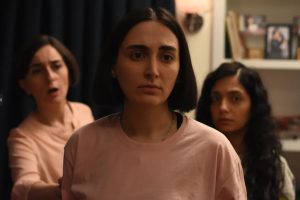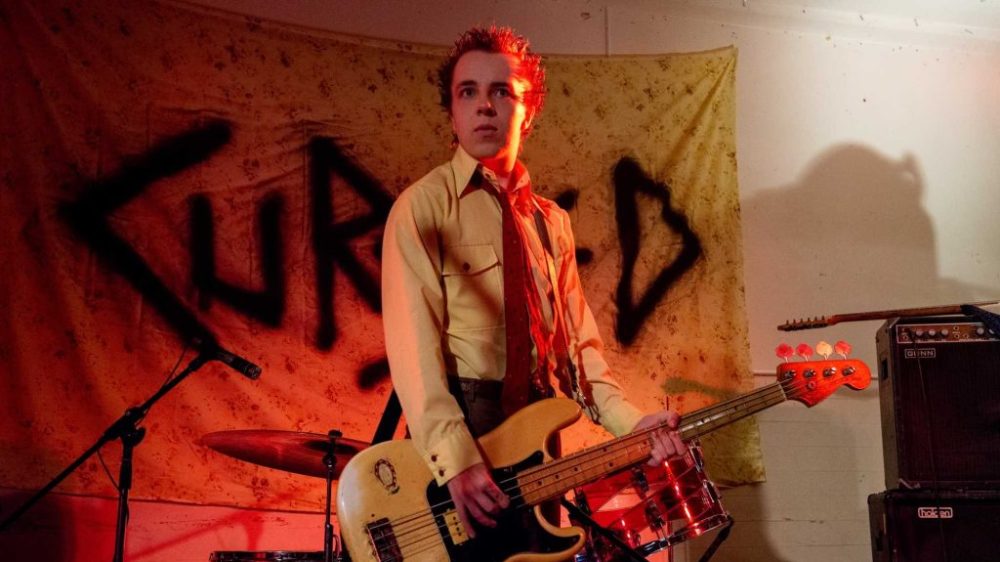Sunday At The Civic: 13th Floor NZIFF Report #2
The line-up of films at The Civic on Sunday found the NZIFF sending us to Scotland, Iran and Christchurch
That’s right, from the comfort of our seat in the grand old theatre we were whisked away, first to the blustery Orkney Islands in northern Scotland during The Outrun, then to a simmering “anti-hijab” protests in Tehran in The Seed Of The Sacred Fig and then to the bubbling music scene of post-punk Christchurch in Head South.
The Outrun
German director Nora Fingscheidt brings Amy Liptrot’s 2016 memoir to the big screen. More of a study than a story, The Outrun follows 29-year-old Rona as she struggles with alcohol and drug abuse, a troubled childhood , mental illness and bad life decisions.
Nora, raised in the Orkney Island in Scotland, is well educated…with a degree in biology…but untethered as we see here stumble through the streets of London, drinking, dancing and partying until she finds herself in rehab.
Fingscheidt chose to tell this story with multiple flashbacks, enabling us to understand how Nora got to where she is now. Our hero returns home but the ghosts of her childhood trauma remain…as does her caring, but quite religious mother.
Will Nora find peace and a purpose? The answer may lie on the craggy, windswept coastline of those Orkney Islands. A thoroughly engaging and satisfying film with an Oscar-worthy performance from Saoirse Ronan.
The Seed Of The Sacred Fig
They say filmmakers should tell their own stories. Well, director Mohammd Rascoulof knows the story of The Seed Of The Sacred Fig all too well, having been sentenced to a flogging and 8 years in prison in Iran. Fortunately he escaped and we and he are better for it.
Known for his lengthy films, The Seed runs at 2hours and 46 minutes and could easily have been 3 separate films.
 First we meet Iman (Missagh Zareh) and his family…wife Najmeh (Soheila Golestani) and their two teenage daughters Rezvan and Sana. Iman has just been given a promotion after toiling away for twenty years for the oppressive government. It’s a dream come true…more respect, more money and bigger house and a shot at becoming a judge, after serving his time as an inspector. But that dream soon becomes a nightmare as protest break out in the streets and the daughters find themselves in the middle of it all…their best friend gets shot in the face and they want to protect her. Najmeh finds herself in the middle, wanting to support her husband and her daughters. But things go from bad to worse.
First we meet Iman (Missagh Zareh) and his family…wife Najmeh (Soheila Golestani) and their two teenage daughters Rezvan and Sana. Iman has just been given a promotion after toiling away for twenty years for the oppressive government. It’s a dream come true…more respect, more money and bigger house and a shot at becoming a judge, after serving his time as an inspector. But that dream soon becomes a nightmare as protest break out in the streets and the daughters find themselves in the middle of it all…their best friend gets shot in the face and they want to protect her. Najmeh finds herself in the middle, wanting to support her husband and her daughters. But things go from bad to worse.
Eventually Iman’s handgun, deployed to him when he gets the promotion, goes missing and the second part of the film deals with the divisions the occur within the family. This is very powerfully executed and the film gives us an opportunity to see things from all four sides.
But the household is a powder keg ready to explode. And it does as Iman rounds up the family and takes them out of Tehran and to his childhood home where he….desperate and misguided…loses it. This is where I felt the film lost the plot. I won’t go into detail other than to say the ending is a tough watch and does feel manipulative. Still, well-worth a watch.
Head South
After that, Head South was a welcome emotional relief.
Director Jonathan Ogilvie was a part of the burgeoning post-punk music scene in Christchurch in 1979, himself having formed a band, YFC, and gone on to direct iconic music videos such as Straitjacket Fits’ She Speeds.
Former Fits’ Shayne Carter is on hand to help with the soundtrack, but like, the previous film, this is very much the director’s own story.
Head South is not a documentary, it is a stylized drama based on a 16-year old kid, Angus (Ed Oxenbould) who has just discovered Public Image Ltd, thanks to his London-based big brother and wants to be in a band.
He hangs out at a record store, meets a girl who plays guitar, buys a bass and eventually scores an opening slot for local band, The Cursed. Of course Angus can’t play and has no band…but that’s what punk is all about.
We also meet Angus’ dad, Gordon (Márton Csókás) who is dealing with a wayward wife. Somehow the two stories converge, but not very smoothly.
Ogilvie and his crew do a great job of recreating 1979 Christchurch and nailing the musical minutia like the posters up in the record store. And real-life musician Benee (aka Stella Bennett) is fantastic in her acting debut. This is clearly a labour of love and it shows.
I felt there could have been a bit more Kiwi music references in the film and I had struggled with the final couple of minutes where a major event is revealed. It may have very well happened like that but it didn’t feel true to the film.
Still, again, I can recommend the film. In fact, I’ve heard the more one sees it, the more one appreciates it…thanks to the director and cast members for answering questions after the screening.
It was a long day in the dark, but with popcorn, pizza and ice cream…I survived and even flourished.
Marty Duda
